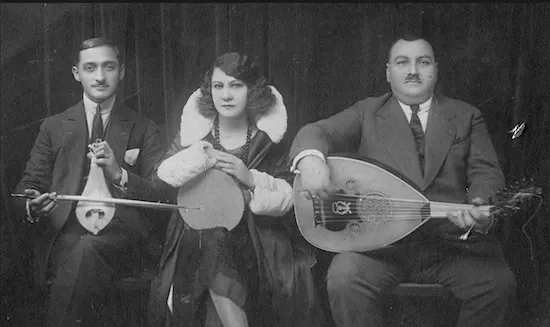Organic Intelligence XXIX: Dope-fiend Greek rebetika
In this month’s antidote to the algorithm, Daniel Spicer boils up a pot of ironwort and heads back a century for a wonderful guide to the drug-blasted music of urban Greece in the 1920s and 30s

By the beginning of the 1920s, the urban folk music known as rebetika had two main schools. In Ottoman Turkish cities such as Constantinople, the expatriate Greek population gathered in public places to hear songs performed by skilled professionals on guitar, violin and mandolin. Even though these songs were usually of mildly erotic, vaguely bohemian content, they were, by and large, considered wholesome entertainment. However, back in Greece, it was another story. Here, the music was performed by street-smart amateurs playing the less refined, lute-like baglama and bouzouki. Rather than the public square, tunes were written and played in prisons and tekedhes – the illicit dope-dens where hashish and other drugs could be bought and consumed.
Naturally, the subject matter of the tunes heard in the underworld of Greek cities like Athens and Piraeus was tougher too, reflecting the lives of the poor, urban citizenry who struggled and strived there. Alongside tales of doomed exile, violent love and harsh prison life, one of the most popular strains of underground Greek rebetika documented the attitudes and activities of the mangas – the archetypal outsider who rejected conventional society and lived only to lounge around the tekedhes smoking hash, listening to music and gambling with dice. Defiantly dwelling on the fringes, he (and almost always it was a male outlaw) was a prescient, pre-WWII precursor to the American Beatnik in almost every way.
For around a decade from 1925, a huge number of records were recorded, mainly in Athens, which captured the spirit of this daringly anti-establishment music and worldview. Yet that came to an abrupt end when the Metaxas Fascist government seized power in 1936 and quickly imposed strict censorship. The music was driven even further underground – but the songs recorded in that brief, bright window of popularity still offer a gritty, and often hilarious, portrait of the life of the mangas.
To read this edition of the Organic Intelligence newsletter, you'll need to be a Sound & Vision or Low Culture subscriber
Find out more here (Opens in a new window)
Already a member? Log in (Opens in a new window)


